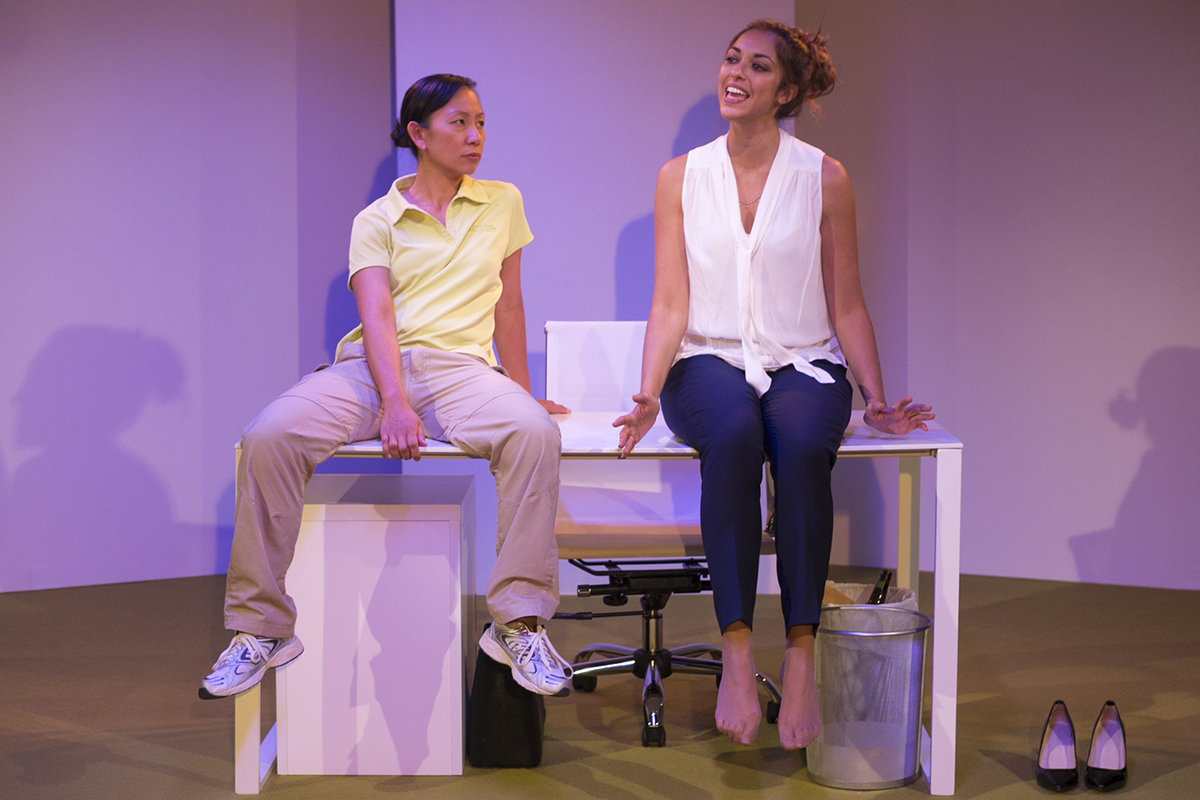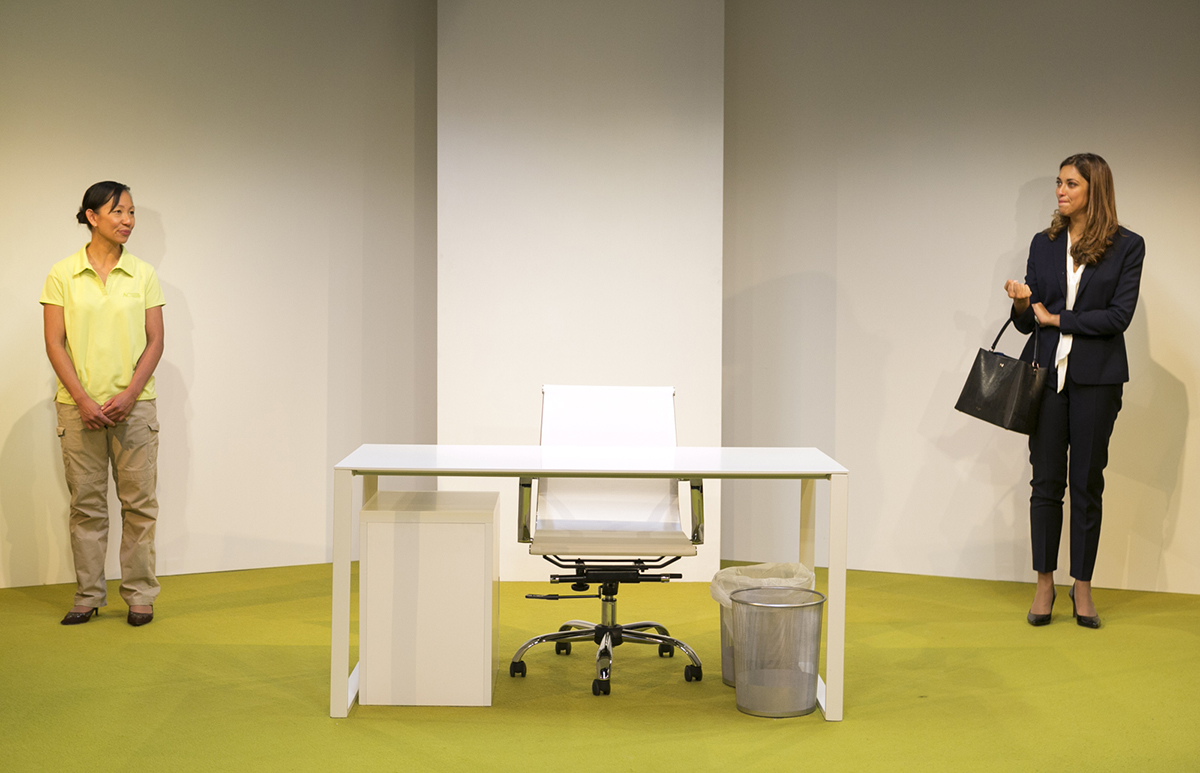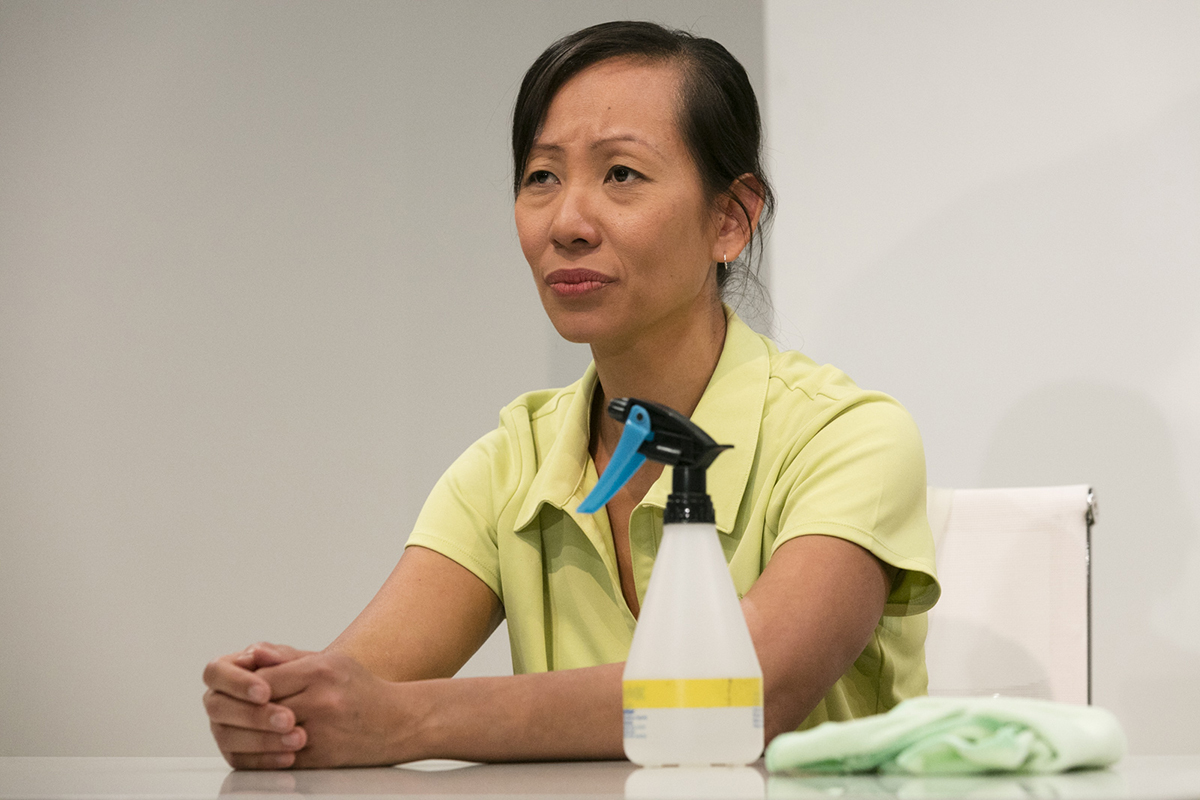
Living the neoliberal nightmare, with a smile
Opposite ends of the business spectrum revealingly meet in Michelle Lee’s frantic fable of life shaped at every turn by neoliberalism — or opposition to it. Brash, recklessly ambitious and single, Indian-Australian Nisha (Kristy Best) is a young executive officer with a major Australian rice marketer; her ambition is to break into Indian distribution after floods there have apparently threatened supply. Older, wiser and a single mother, first generation Chinese-Australian Yvette (Hsiao-Ling Tang) is a failed importer of fake Prada products; now she’s a cleaner bickering with Nisha about the extent of her duties, which she drolly redefines as a set of mutual obligations.
In soft pastel early evening light, the pair recurrently meet, forming a highly tentative friendship, each of them essentially lonely, conveying the battles they’re engaged in, but not by telling. When Yvette argues with her law school student daughter, Sheree, who’s being prosecuted for throwing food at the Coles CEO in protest at wastage, Nisha/Best becomes Sheree; just as Tang/Yvette becomes Graeme, Sheree’s boss, a bland, pragmatic downsizer, whom she fatefully overrides at a board meeting, lying about her contact with the Minister of Agriculture in order to push into India.

Hsiao-Ling Tang, Kristy Best, Rice, Griffin Theatre & Queensland Theatre, photo Brett Boardman
The performers execute these and other roles with gestural and vocal finesse. Johnny Song, Yvette’s unsympathetic warehouse landlord is listed in the script as a Chinese-Australian bogan, but in production he’s an hilariously convincing bro, all dancing pointy fingers and elbows. Costume changes minimally gesture transformation: Tang’s Gretel Patel — Nisha’s opponent in India — swans about with a trailing scarf; the Coles CEO’s grimly cocky son is Best in a hoody. Other characters include Tang as Avineet, Nisha’s too smooth boyfriend and successful operator of a food truck business while disdainful of Nisha’s ambition. Valerie (Best), the amusingly tough Russian boss of the cleaning business, enjoys mocking the rice company executives with Yvette. It’s a rawly competitive world where clipped, blunt joking and knowingness cover ignorance and allegiances are provisional.
Scene setting and segues into these multiple characterisations are sparely framed and signalled: “This is the part of the story where we first meet;” “Take the stair to ground floor. Get into the car. Made-in-Melbourne daughter, she pissed off.” “This is the part where we eat.” Otherwise we are plunged into encounters. On opening night at The Stables, the frenetic pace and a performance pitched at max by Best, left not a few of us chasing the narrative early on, a problem not solely attributable to the performers in a work with brisk transitions barely minutes in.
I began to wonder just how having two actors play all the roles benefited the play; taut economy of action and performer virtuosity are insufficient. Stripped of the minimal framing device and distributed to a larger cast, how different would the work be; what might be lost? At its best, the writer’s structural conceit is realised as a nigh surreal, sometimes farcical, sometimes melodramatic world of relationships playing out in terms of class, race, generations, gender and power, and all embodied in two characters who feel the enormous weight of the world pressing down on them and who, in effect, cast each other in the roles of those with whom they struggle. This is not literally the case, but it is what’s felt and is, to varying degrees, successful in suggesting a haunting connectedness across cultures and hierarchies and from global business to personal crises — Nisha’s wracking concern for her Didima (grandmother) who has dementia and Yvette for her about to be gaoled daughter Sheree (a plight melodramatically ramped up with a late, unwelcome confession from Yvette about her separation from the girl’s father).

Hsiao-Ling Tang, Rice, Griffin Theatre & Queensland Theatre, photo Brett Boardman
Business (even with food trucks) and relationships don’t end well in Rice and punishments are assigned, as if some kind of slate has to be wiped clean. Thai-Australian playwright Disapol Savetsila’s Australian Graffiti, which I reviewed last week ends with a slightly more optimistic but similarly provisional ending in another tale of failed business. In Australian Graffiti it’s racism and traditional familial expectations that block cross-cultural harmony. In Rice, cross-cultural encounters are largely functional and don’t run deep; the exception is Nisha and Yvette who share much and learn a lot about each other and without the intrusion of racism. But, after a tender final meeting, they toy with us, telling of time spent together beyond the workplace, but promptly reveal it’s a lie. There’s no room for sentimentality. Is this the reality of multicultural Australia — a failure of cross-cultural intimacy? Distance from one’s inherited culture is also emphatic in Rice: Nisha is unprepared for India (weather, food, protocols), Yvette refuses to live in a heavily Chinese-Australian suburb.
Rice’s persistent wit, its satirical bravura and its cultural and economic scope cannot be reduced to a warmhearted account of an unlikely friendship, as some reviewers have done. Step back from the immediate experience of the production and what stays with you is existential and social unhappiness, the brutal individualism of neoliberalism and the anger of the play’s helplessly bitter “fuck you” moments. But tonally, Michelle Lee cleverly balances angst and humour and in this is well-supported by Best, Tang and director Lee Lewis and a spare almost otherworldly office design by Renee Mulder with lighting by Jason Glenwright that matches the sense of fable that the writing conveys — fantastical, while all too real.
–
Griffin Theatre Company, Rice, writer Michelle Lee, director Lee Lewis, performers Kristy Best, Hsiao-Ling Tang, designer Renee Mulder, lighting design Jason Glenwright, composer, AV designer Wil Hughes, associate sound designer Tony Brumpton; The Stables, Sydney, 21 July-26 Aug
Top image credit: Hsiao-Ling Tang, Kristy Best, Rice, Griffin Theatre & Queensland Theatre, photo Brett Boardman






